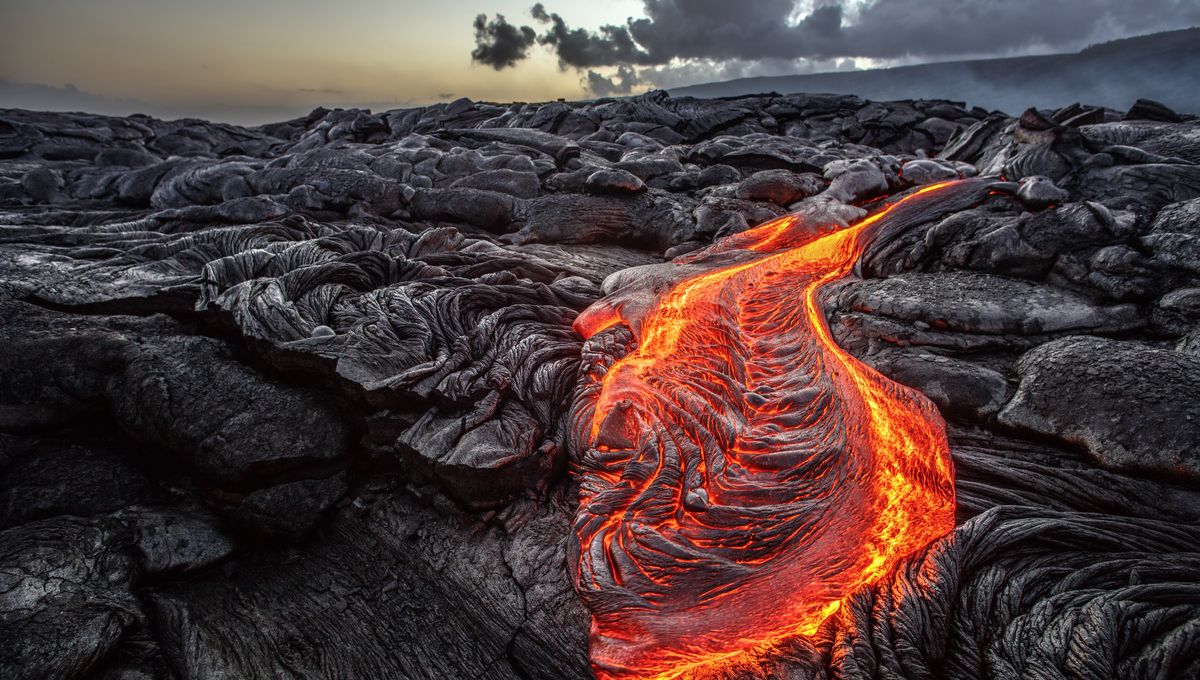
There are many reasons humans have valued gold throughout the years: it’s stable, malleable, non-toxic, and of course, shiny. But one of the main reasons you might hear – that it’s particularly useful as a currency because of its rarity – isn’t strictly true. And, thanks to a new revelation this month that the Earth’s core appears to be leaking, it’s actually getting falser.
“When the first results came in, we realised that we had literally struck gold!” reported Nils Messling, a geochemist in Göttingen University’s Department of Geochemistry and lead author of a new paper on the discovery, in a statement this week. “Our data confirmed that material from the core, including gold and other precious metals, is leaking into the Earth’s mantle above.”
It’s the strongest evidence yet that the Earth’s core is leaking material such as precious metals – and it comes as the result of a geological analysis of rocks in Hawai’i. Among the elements found in the samples collected on the volcanic islands, Messling and his colleagues made a surprise discovery: a particular isotope, 100Ru, of the silvery-white metal ruthenium.
So, why this particular isotope? Well, ruthenium does exist on the Earth’s surface – but, like gold, it’s far more abundant within the core. 100Ru specifically is even more traceable: “the Ru isotope composition of accreted material changed during later stages of Earth’s growth,” the research team write in their paper, “indicating that the core and mantle must have different Ru isotope compositions.”
Essentially, if the rocks had more 100Ru than it “ought” to, as part of the Earth’s crust, that’s a pretty good sign that it originally came from the core, some 3,000 kilometers (1,864 miles) under our feet.
“Our findings not only show that the Earth’s core is not as isolated as previously assumed,” said Matthias Willbold, a professor in the same department as Messling and coauthor of the paper. “We can now also prove that huge volumes of super-heated mantle material – several hundreds of quadrillion metric tonnes of rock – originate at the core-mantle boundary and rise to the Earth’s surface to form ocean islands like Hawai’i.”
Of course, as bonza as a whole new source of gold and other precious metals may sound, we know what you’re thinking: isn’t this the kind of thing they make apocalypse movies about? Shouldn’t we be worried that the Earth’s core is leaking?
Well, no – not least of all because there’s still just so much left unknown. Is this leakage rare, or normal? What causes it? What else has leaked out? Mostly, these questions have yet to be answered.
“We know very little about Earth’s core, other than that it exists,” explained Forrest Horton, a geochemist at Woods Hole Oceanographic Institution and lead scientist on the team who, in 2023, made a similar discovery that the core was leaking helium into the Earth’s crust. “Traditionally, the core and outer layers of our planet (mantle and crust) were presumed to be geochemically isolated (i.e., material does not transfer back and forth). Increasingly, scientists have been challenging this notion.”
But rather than fretting, Horton found the discovery “exciting,” he told Vice at the time, “because it suggests that the deep Earth is more dynamic than we realized: elements move between the metallic and rocky parts of our planet.”
And there are, of course, upsides. Not to sound too Smaug-like, but gold is a pretty good resource: it’s used in electronics, dentistry, medicine, and even aerospace engineering. It’s merely a cherry on top that you can now boast a wedding ring that may have come from the innermost depths of the planet.
For Messling and his team, though, the real prize is all the sweet new geological investigations they get to carry out. “Whether these processes that we observe today have also been operating in the past,” for example, “remains to be proven,” Messling said.
“Our findings open up an entirely new perspective on the evolution of the inner dynamics of our home planet.”
The study is published in the journal Nature.
Source Link: The Earth's Core Is Leaking. The Result: More Gold